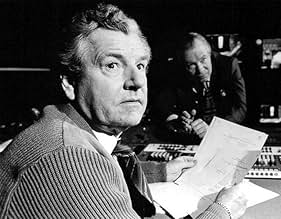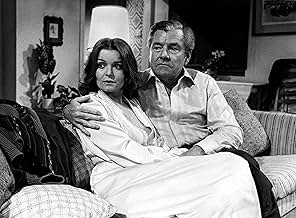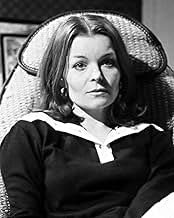As this three-episode story begins, English TV producer Peter Ingram (Kenneth More) is preparing the next group of stories in his long-running series, "An Englishman's Castle." A nostalgic wartime series, it tells the story of a British family living through the "Phony War" and the "Lightning War" (blitzkrieg) of the first year of World War II, with the fall of Poland, the fall of France ... and the fall of Britain ... to Nazi Germany... 38 years ago.
The series is a popular part of British television. The German Gestapo's watchdogs do not mind it: they approve of patriotic sentiment, so long as it does not turn anti-German. And Ingram has played this game for a very long time, all of his adult life. He is prepared to continue playing it. Until the day comes when the British Resistance approaches him for help...
I liked the basic story itself, but I especially liked the depiction of the "show within a show". The series's musical signature was a stately orchestral "Lilibulero", giving it the same "sound" as the long-running series "Upstairs, Downstairs" -- which also depicted life during a time of turbulent change in Britain. ("Lilibulero" also happens to be the musical signature of the real-world World Service radio program that is broadcast by the BBC, the British production company that aired this television show.) It was interesting to see how an "Upstairs, Downstairs"-like show might have looked if Britain had not continued to win European wars in the 20th century.
One especially striking moment took place during the first rehearsal of an upcoming episode of the series. Ingram was basing the series on his own life during those years ... and in his own life his older brother was in the British military and was killed. The TV character corresponding to his brother was very popular with the British audience, and the actor playing him expected to have a cozy, secure job for quite a few more seasons. When Ingram passed out the next week's script and the cast seated around the large table read through them, everyone was stunned when they learned that in this episode that very popular character was killed. Truly killed ... not the "he's missing and presumed dead" "killed" that soap operas sometimes use to bring a character back on a whim. Killed-dead.
The entire cast protested. The actor protested, of course, but the others protested out of sympathy for him. This was more than simply a role, they argued, it was his livelihood, his income. How could you, in effect, sack him, when he had done nothing wrong ... when he had done nothing to deserve this cruel treatment? But Ingram's brother had done nothing to deserve being killed, either. Yet he died ... and so, Ingram explained, the time had come for this character to die.
We see many stories set "backstage". We don't often see this aspect of "backstage life" for working actors. Although I believe it had no significant effect on the overall story (the Gestapo and the British Resistance), it was a television moment that has stayed with me for more than 20 years (I write this in 2004). I remember this show fondly.

















